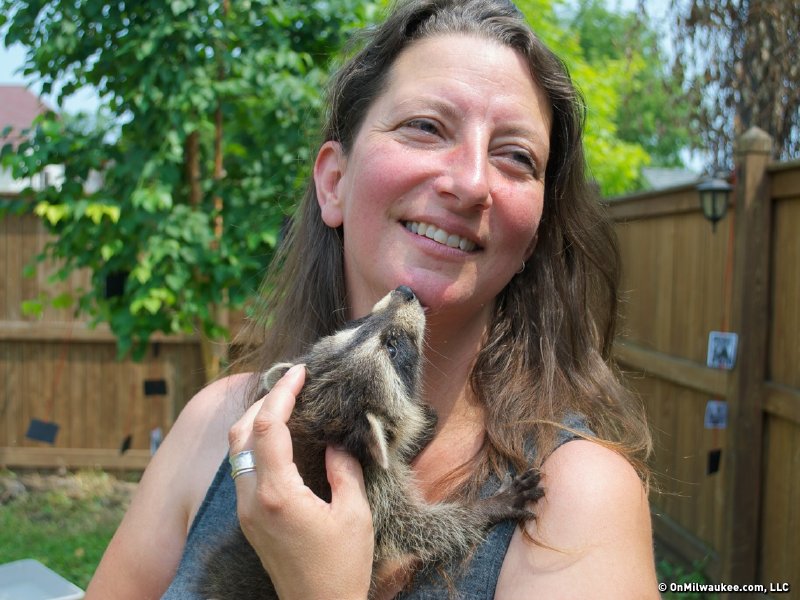Alissa Gonyea, a Milwaukee Public Schools teacher, planned to have a lesiurely summer that included travel and camping adventures with her son and nephew.
Instead, she is caring for four baby raccoons.
"If you would have told me two weeks ago I’d be doing this, I wouldn’t have believed you," says Gonyea.
A few months ago, a Madison-based friend of Gonyea's posted on her Facebook page that Wisconsin WildCare was looking for people to foster litters (sometimes called "kits") of raccoons.
Gonyea, who lives in Riverwest, responded that she was interested, but did not hear anything back until last Sunday when a group representative informed her there was a litter waiting for her.
So Gonyea picked up the critters and named them Eeenie, Meeney, Miney and Moe. (Miney and Meenie are girls; Eenie and Moe are boys.)
Through the organization, Gonyea is licensed to house the raccoons who were vaccinated for rabies.
After their mother died of an unknown cause, the baby raccoons were too young to feed themselves and quickly became malnourished. Once rescued, they've been primarily bottle fed with raccoon formula.
Yes. Raccoon formula.
Gonyea purchased it from a man in Illinois who specializes in concocting formula for myriad creatures from shrews to humpback whales. She paid $83 for approximately a two-week supply and had the formula overnighted to her Riverwest home. The raccoons eat four times a day.
Because she exclusively breastfed her son, Gonyea had never made a formula bottle before.
"It was all new to me," she says.
Every day, the raccoons spend time outdoors in Gonyea’s enclosed backyard. They enjoy climbing the tree and "bathing" in a dishpan filled with water.
Gonyea will keep the raccoons until they are 10 pounds – they are currently two pounds – which experts estimate will be mid-September or so.
Once the creatures are old and strong enough, Gonyea plans to "soft release" them on a friend’s land in Wisconsin Dells. A soft release means they will live in nature but also have access to a cage and food.
Currently, the raccoons have an indoor metal cage, but they will soon move to a larger, outdoor enclosure.
Raccoons are nocturnal, but so far they have not been disruptive during human sleeping hours. They do, however, emit a hitch-pitched teetering noise that sounds like a nervous chortle and some scientists believe raccoons have a vocabulary with 50 or more different vocalizations.
Native to North America, raccoons are the largest of the procyonid family, which also includes coatis, olingos, ringtails, cacomistles and kinkajous.
Arguably, the raccoons' most interesting features are their mask-like black eye markings and their creepily dexterous hands that feature five digits. They are also believed to be intelligent. But Gonyea, her nephew and her son most appreciate that the raccoons are affectionate, cuddly and non-aggressive.
"Especially Meenie," she says, nuzzling her tiny, fuzzy face.
Molly Snyder started writing and publishing her work at the age 10, when her community newspaper printed her poem, "The Unicorn.” Since then, she's expanded beyond the subject of mythical creatures and written in many different mediums but, nearest and dearest to her heart, thousands of articles for OnMilwaukee.
Molly is a regular contributor to FOX6 News and numerous radio stations as well as the co-host of "Dandelions: A Podcast For Women.” She's received five Milwaukee Press Club Awards, served as the Pfister Narrator and is the Wisconsin State Fair’s Celebrity Cream Puff Eating Champion of 2019.







